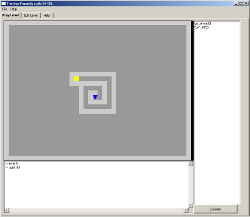
deeply sorry about the lackof mac/binary versions, really
Spent the weekend fidgeting about with Lua on my bus trip to/from galway over the weekend (and an hour or two in between). Made a small game inspired by Quinn Dunki’s recent effort, gate. It’s lua-themed, instead of circuit-themed, though. And very short.
And windows/linux only. To play the windows version, you’ll need to download lua.
Anyway, here ’tis:
DOWNLOAD FOR WINDOWS OR LINUX (10kb)
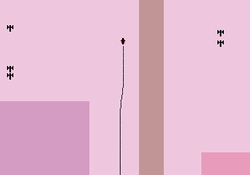
Rough around the edges, but it be okay for What It Is, I think.
Thursday, January 1, 2009
An effort for the thepoppenkast.com 3-hour cities comp.
Windows zip 600kb
Mac OSX 10.5+ zip 600kb
Src zip 200kb
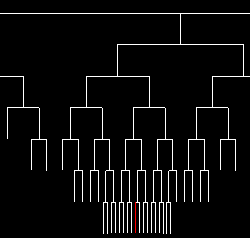
I have quadtree and octree-based stuff up and running; I'll post 'em some time in the near future.
Monday, November 17, 2008
This is what the game I posted a couple of days ago, Endless Cavern, was essentially based around.
The haskell code is simple (not awfully efficient, but that’s not a concern just yet), and I’ve tossed it here (32kb). You can control the prototype by pressing left/right on the keyboard.
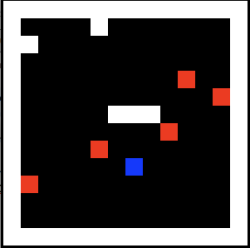
hopefully this won't be my last toying about with Graphics.Rendering.OpenGL
Thursday, October 9, 2008
I decided to try doing a one-player prototype of this game, and to do it in haskell this time as an exercise instead of C++. It’s a much more bare-bones things, but might be of interest to some people (requires OpenGL and GLUT to be installed).
In this demo, you are a red or blue block, the enemies are red blocks, moving in various patterns. When you overlap with an enemy block, your colour changes.
I’m not bothering with a binary distribution, but the source is here.
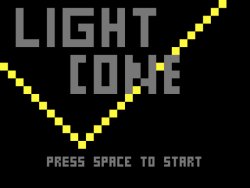
and here we have the lovely lovely title screen
I always have wanted to program some sort of game using special relativity, but haven’t quite figured out a good way to do it yet. However, I did think, just recently, ‘gosh, I should be able to do something with lightcones’ though. So, in this simple concept game light has a finite speed, which basically means that when you see things far away from you, you’re not seeing them as they are now, but rather as they were some time in the past.
Continue reading ›




